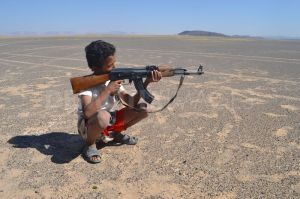
National reconciliation, preserving territorial integrity, forming the body of state authority, conducting constitutional reform, reforming the civil service and local self-government, solving the problem of separatism and regulating relationships with neighbours – these are just some of the issues standing before the Yemen government, which have to be solved at a time when the country’s economy is on the decline. Yemen is one of the poorest Arabian countries with its current economic development levels being higher than only two nations, Mauritania and Sudan.
The overall list of problems also includes weapons that are being delivered to Yemeni separatists who are opposing the activities of the National Dialogue conference. Experts believe that Iran has intensified weapon supplies into Yemen as a response to Saudi Arabian, Qatari and U.S. military aid to the Syrian opposition. The Yemen navy regularly arrests boats carrying large shipments of illegal weapons of Turkish or Chinese origins.
At the same time, along with the intensifying southern separatists, there are also the Houthi insurgents who are fighting for the reconstruction of the Zaidi Imamate in the northern part of Yemen, which has existed here for almost a thousand years, beginning from 969. The Houthis claim that they are defending their religion, Zaidism, a Shiite branch, from being absorbed by Sunnism, which is supported by the governing elite. Yemen officialdom considers Houthis to be part of the pro-Iranian extremist groups and with the help of the Saudi Arabian air force and American drones regularly bombs their bases in northern Yemen and territories bordering the KSA.
The southern separatists exist because the country was, for a fairly long period of time, divided into two nations, Northern and Southern Yemen. After the country was united, the administration pursued a policy of extreme rights infringement for the southerners in practically all spheres. Southern officers were leaving the army and the law enforcement, despite the fact that the level of education within the southern Yemeni population was higher. This caused a wave of discontent and led to the formation of a relatively strong separatist movement, which was heavily repressed by the government.
As such, to split Yemen in half, one would only need to supply the country with the necessary amount of weapons, which will then have an impact on the entire region while finding its way into neighbouring countries, as it happened with the Libyan military arsenal.
The best case scenario would be the success of the National Dialogue conference with the participation of the leading political parties and movements, however, the recent terrorist attacks in the city of Sa’dah and on the outskirts of Sana’a cast doubt over such prospects. Presently, the situation in Yemen is a tangle of domestic, inter-religious and clan issues, which are quite capable of tearing the country in half in the near future, repeating the Somali scenario on its territory, which would be the creation of a number of simultaneous government structures.
As the political dialogue is reaching its final stages in Yemen, the terrorist activity within the country is actively increasing, mainly involving Al-Qaeda militants and other extremist groups associated with them. The brazen attacks by the “Al-Qaeda in the Arabian Peninsula” militants (AQAP) targeting the army, the police and other power structures (on September 30 of this year, the AQAP seized the headquarters of the Second Military District) are becoming a daily reality and are sincerely aimed at destabilizing Yemen and undermining political dialogue. The extremists are not only murdering military and security personnel, but they are also taking them hostage together with civilians. The local anti-terrorist forces are powerless against them and are unable to free the hostages. Senior officers in the army and the special services are increasingly becoming the victims of AQAP attacks.
The practice of abducting western hostages is also continuing in Yemen. Americans are increasingly becoming the insurgents’ victims, with the abductions taking place almost in the center of the capital. It is painfully clear that such acts are perpetrated by outside forces, primarily from the ranks of the “regional” players, who are fighting for spheres of influence within Yemen. The south is particularly attractive to them because it is the location of the energy resources and other natural riches. The insurgents’ financial support is coming from numerous private Islamic funds in Saudi Arabia, Qatar, UAE and Kuwait.
Some outside forces have started to accuse the former president Ali Saleh of his involvement in the present rampant violence in Yemen. Him and his supporters are being credited with the explosions of gas pipelines and power lines, allegedly stating that their goal is to undermine the positions of the present head of state Abd Rabbuh Mansur Hadi and to cast doubts over his ability to deal with the country’s problems. After all, he is responsible for concluding the national political dialogue and solving the most pressing socio-economic problems within the country.
The future of this country still remains doubtful. Even if the National Dialogue congress is able to reach unanimous decisions. These decisions will still need to be implemented in a time of ongoing AQAP terrorist activities, while the country’s south can very well secede from the nation. And this is a very real possibility.
Viktor Titov, Ph.D. in Historical Sciences, is a political commentator on the Middle East, exclusively for the online magazine “New Eastern Outlook”.
